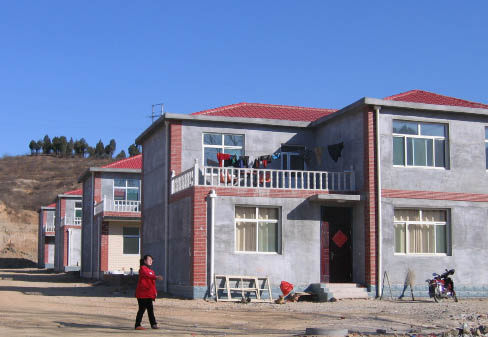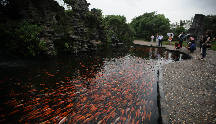Rural Housing Project Changes Landscapes and Lives
Rural Housing Project Changes Landscapes and Lives
By staff reporter ZHU HONG
XIBAIPO in Hebei Province was a small village of some 100 people, but became a focus of national attention in the 1940s. Local farmers were staunch Communist supporters. The rolling Taihang Mountains to the west and broad Hutuo River on its south side provided a natural defense for this hard-working community that always nurtured abundant harvests. As the revolutionary strongholds in Hebei and neighboring provinces converged with the growing league of Communist territories, Xibaipo was selected to be the new command center of the Communist Party of China in 1948.
 |
|
Village construction planning has made installation of utilities easier, leaving more space for modern agriculture and industries. |
The Last CPC Rural Command Center Before National Victory
In May 1947 the CPC Central Committee Work Committee moved to Xibaipo from Yan'an. In July it convened a national land conference, which adopted the Land Law Outline. Accordingly land reforms were unfurled in Communist-controlled areas, over a period of one year distributing plots to 100 million peasants and consequently winning their full support for the People's Liberation Army, which immediately saw a big leap in enlistment.
Shijiazhuang was liberated on November 12, 1947, connecting two liberated areas – Jin-Cha-Ji, which straddled Hebei, Chahar and Shanxi provinces, and Jin-Ji-Lu-Yu, which encompassed parts of Shanxi, Hebei, Shandong and Henan provinces. On May 26, 1948 the CPC Central Committee and the PLA Headquarters, both headed by Mao Zedong, moved to Xibaipo, turning the isolated hamlet into the new nerve center of the Communist forces.
CPC Central Committee offices were housed in a walled compound of adobe houses, which still stand on the site. A giant military map hangs in the No.1 Bureau of the Central Military Commission. In times of destitution even things like color pencils were a luxury, so the cartographers marked the map with red and blue wool strands. The harsh conditions never made a dent in the confidence and zeal of CPC leaders or rank and file members. It is in these Spartan offices with their sparse supplies that the CPC caucus planned the Liaoshen, Huaihai and Pingjin campaigns, which led to the final collapse of Kuomintang rule. Premier Zhou Enlai once joked in Xibaipo: "From our command post here we don't dispatch money, food or soldiers, only send many telegraphs, and still we defeat the Kuomintang."
In March 1949, when the national victory was in sight, the Second Plenary Session of the Seventh CPC Central Committee was held in the dining room of the compound. Mao Zedong, who chaired the meeting, made the famous speech calling on all Party members to remain modest and prudent, free from arrogance or rashness on the job, and to preserve the merits of plain living and hard work. Later that month the CPC Central Committee and the PLA Headquarters left Xibaipo for Beijing. In October the People's Republic was founded.
Services
Economy
- Eco-agriculture and Eco-tourism Power Nanchang’s Green Development
- Balance Environmental Protection and Economic Prosperity – Nanchang Looks to European Technology for Green Development
- Sustainable Growth Requires Wiser Energy Use
- Chinese Economy: On the Path of Scientific Development
- China's Economy over the Last Ten Years

